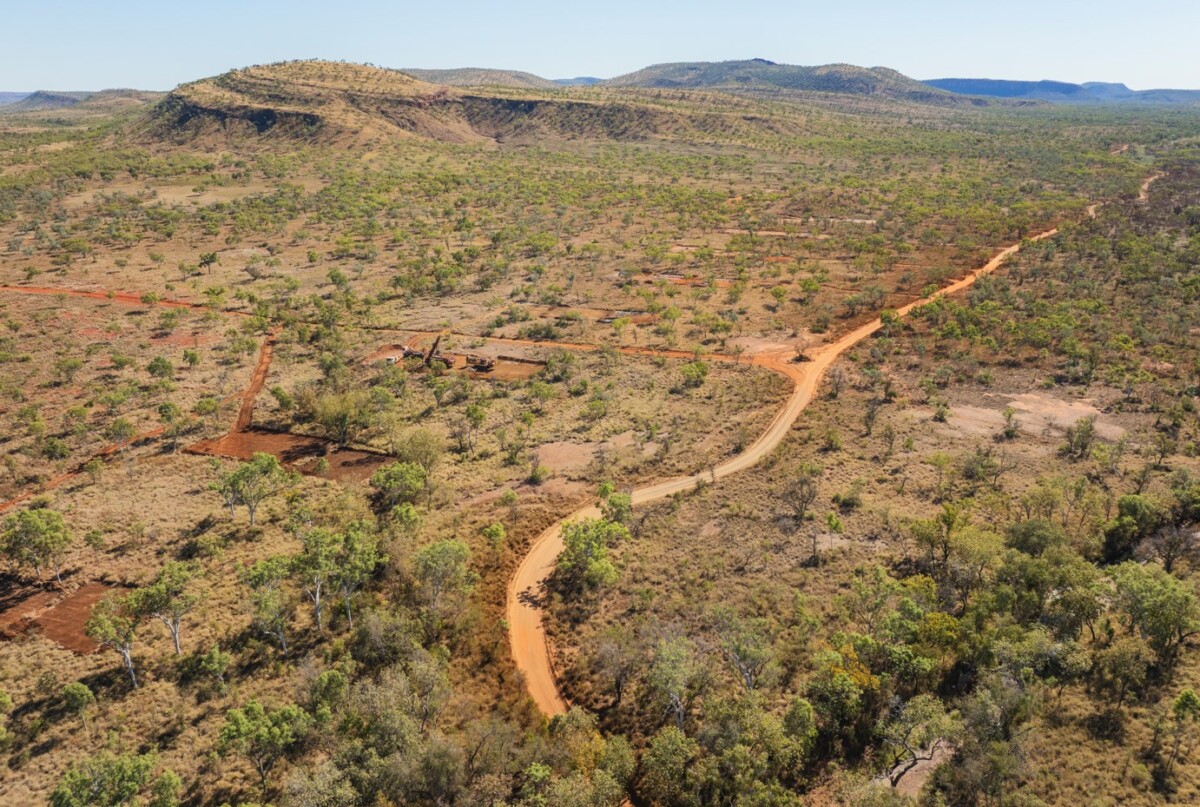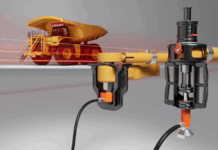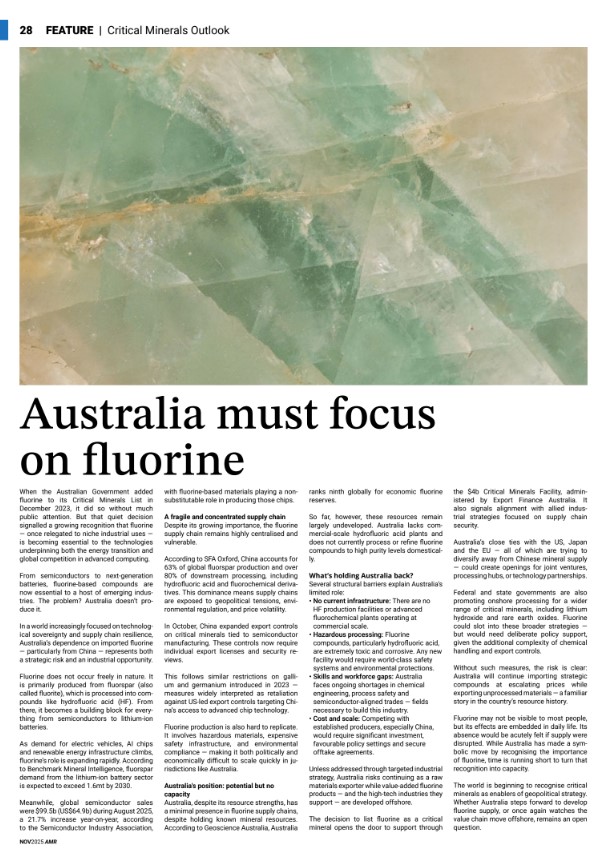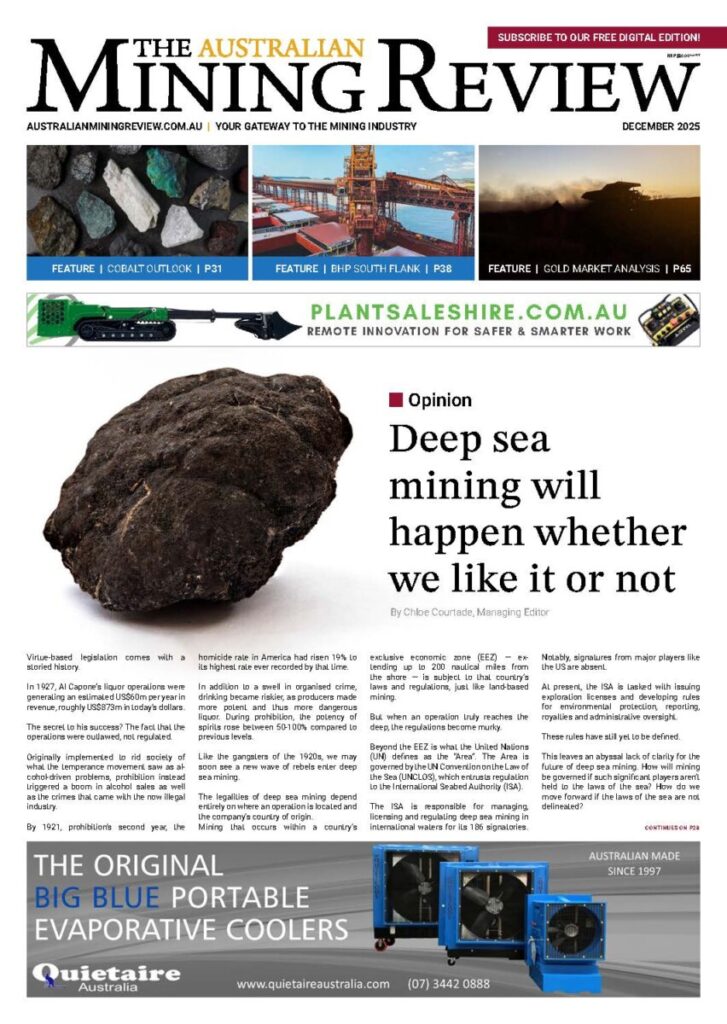Australia’s first fluorite project

Semiconductors are fundamental building blocks for all modern electronics, from smartphones and medical equipment to vehicles and sustainable technologies.
Yet, Australia is currently a bystander in the global supply chain for semiconductors.
Recent geopolitical concerns have highlighted this supply chain vulnerability, prompting the Federal Government to switch gears in its approach to the industry.
One company is working to create a new critical minerals sector in Australia that will play a vital role in diversifying the supply chain for semiconductor manufacturing throughout Asia. Tivan (ASX: TVN), based in Darwin, Northern Territory, is building a company of strategic importance across northern Australia. The company has been accumulating world-class critical minerals resources over the last few years, realising the potential of a domestic critical minerals industry well before its peers.
Tivan is on track to become Australia’s first domestic producer of fluorspar with its Speewah project in the Kimberley region of WA — and has assembled a pipeline of projects that will further strengthen the bilateral relationship between Australia and nations throughout Asia, namely Japan.
The company has already garnered significant Federal Government, receiving Major Projects Status for its Speewah fluorite project and international interest in the form of partnerships with major Japanese stakeholders.
The Speewah project
Home to one of Australia’s largest fluorite deposits, Speewah has an estimated resource of more than 3.4mt of contained calcium fluoride. As Australia’s only JORC-compliant fluorspar resource, it is considered world-class in its scale, grade and mineralogy. The deposit is outcropping and also benefits from its northern location, 100km south of the Port of Wyndham.
Speewah is not only shaping up to be Australia’s first fluorite project. It also hosts the world’s largest vanadium deposit, with JORC compliant measured, indicated and inferred resource of 4.7bt that has produced very high vanadium in concentrate grades.
Vanadium-based battery systems are gaining popularity across utility-scale projects for the global energy transition. However, Australia is yet to establish commercial production. Targeting these minerals synergistically allows Tivan to enhance the economic viability and sustainability of both its fluorite and vanadium operations.
Tivan Executive Chairman Grant Wilson says that the Speewah project is integral to enhancing Australia’s standing in the critical minerals sector.
“Critical minerals are in the midst of a historic year, with unprecedented levels of policy activism,” he said.
“The tailwinds are very strong for Speewah and for Australian critical minerals.”
Global significance
In December 2024, the Federal Government awarded Speewah’s fluorite operation Major Project Status, recognising its national significance and alignment with the Australia’s critical minerals strategy and national battery strategy.
The project has also attracted significant Japanese interest, proving its global significance. Speewah is being developed in partnership with Sumitomo Corporation (Sumitomo), a leading Japanese trading house, and the Japan Organisation for Metals and Security (JOGMEC).
In May 2025, Tivan and Sumitomo Corporation executed binding agreements for the incorporated joint venture (IJV) for the development, financing and operation of the project.
Sumitomo Corporation’s interest in the IJV is held via an incorporated subsidiary, Japan Fluorite Corporation (JFC). Under the terms of the binding IJV agreements, JFC may invest up to $60.3m via three tranches for an equity interest of up to 22.5% in the IJV.
Tivan, Sumitomo Corporation and JFC have also agreed on a term sheet for the offtake of up to 100% of the product over the life of the project, of which 80% of the offtake will be on a take or pay basis.
The execution of the binding IJV agreements was a landmark achievement for Tivan and the Australian critical minerals sector, delivered following a year of extensive collaboration with Sumitomo Corporation. It represents a shared vision of establishing a new critical minerals commodity export for Australia that will strengthen key supply chains in Asia, especially semiconductor manufacturing, where fluorinated chemicals play an indispensable role.
Molyhil tungsten and molybdenum
In September 2025, Tivan announced it would further diversify its portfolio with the acquisition of the Molyhil tungsten-molybdenum project for $8.75m. The project is located approximately 220km north-east of Alice Springs and adjacent to Tivan’s Sandover fluorite project.
The Molyhil project is an advanced, high-value critical minerals project, containing a mineral resource of 4.65mt at .26% tungsten trioxide and .09% molybdenum for 12,100t of tungsten trioxide and 4,400t of molybdenum.
Molyhil’s proximity to Sandover and other planned projects allows Tivan to leverage shared infrastructure, synergistic project finance options and integrated planning to develop a critical minerals precinct in central Australia.
“Acquiring Molyhil was a logical step for us, with our Sandover project next door,” Mr Wilson said.
“Potential revenue from Molyhil was previously estimated at about $500m. We think this has more than doubled because of the disruptions to global supply chains.”
The Molyhil deposit is considered an orphaned project, with small scale mining at the site in the 1970s and early 1980s. Thor Energy completed a definitive feasibility study in 2018, and an updated MRE was published in May 2024.
The acquisition of Molyhil has bolstered Tivan’s significance in the Australian critical minerals landscape. The strategic benefits of the acquisition include a diversified and resilient supply chain, increased control over processing and additional opportunities — expanding the company’s resource focus.
Tivan will focus on progressing a pre-feasibility study for Molyhil, consistent with its rigorous technical and economic assessment framework to optimise project planning across its other projects. The project is amenable to rapid development as Tivan can leverage the existing data and infrastructure of the established site to deliver a low-impact development pathway.
By continuing to diversify its portfolio, Tivan is fortifying its resilience to fluctuating market dynamics while simultaneously reinforcing Australia’s critical mineral supply.
Leading technology and innovation
Not only is Tivan revolutionising the way Australia approaches critical minerals processing and extraction, but it is also investing heavily in advancing related technological innovation.
In September, the company announced further excellent results from ore sorting technology at its Speewah fluorite project, returning calcium fluoride grades as high as 99%. Preliminary ore sorting testwork demonstrated the rejection of 56% feed to the sorter with low fluorite losses.
Tivan is now investigating the potential for the introduction of ore sorting technology and its range of potential development, operational and economic benefits including reduction of process plant equipment sizing water consumption, tailings tonnages, operating costs and sustaining capital costs.
“Ore sorting has emerged as a potentially viable development option,” Mr Wilson said.
“As the opportunity is significant, our team is hard at work in assessing feasibility and in creating pathways to integrate the technology into the project’s flowsheet.”
Tivan has a long-term commercial partnership with CSIRO, Australia’s national science agency, to facilitate development and commercialisation of the TIVAN+ critical minerals processing technology.
TIVAN+ is an advanced critical minerals processing technology designed to commercialise the extraction of minerals from vanadiferous titanomagnetite (VTM) ore bodies while reducing environmental impacts. It produces three high-value commodities — titanium, vanadium and iron from magnetite concentrate.
Tivan has continued to progress an assessment of two vanadium processing technology pathways for the Speewah vanadium project using TIVAN+ and a conventional salt roast processing flowsheet.
In early 2025, Tivan completed a salt roast test work program for the project that successfully produced high-purity vanadium pentoxide with a grade of 99.86% without the use of solvent extraction. The test work program was announced in February 2024 and was designed to evaluate the commercial viability of development pathway from Speewah ore to vanadium flow batteries.
The vanadium pentoxide produced is being used for vanadium electrolyte (VE) preparation and testing at the University of NSW, specifically targeting achievement of the VE specifications of Sumitomo Electric Industries (SEI) — a Japanese leading manufacturer of large-scale, long-life vanadium flow batteries.
“The testwork conducted at UNSW validated Speewah’s vanadium pentoxide for commercial VE production, really highlighting our potential to be a key supplier for the energy storage market,” Mr Wilson said.
Following the publication of the CSIRO TIVAN+ test work results in May 2024, Tivan received significant third-party interest in the technology, particularly from VTM resource owners both in Australia and overseas.
The excellent results returned for both the TIVAN+ and salt roast technology pathways provide significant development optionality for Tivan and further bolster Speewah’s standing as the world’s premier VTM resource.
Tivan continues to progress its assessment of the two vanadium processing technology pathways.
Supporting local communities
Since early 2023 Tivan has worked diligently to establish respectful and meaningful relationships with Traditional Owners and Native Title Holders in the East Kimberley region and with the Kimberley Land Council. Tivan is committed to working with communities across the East Kimberley to create long-term opportunities and encourage broader community engagement.
Tivan expects to establish a local office in Kununurra in Q2 CY2026 to further facilitate engagement with the surrounding community, including around workforce development and local procurement opportunities.
“One major point of difference for Tivan is that we spend a significant amount of time on Country,” Mr Wilson said.
“Traditional Owners are very involved in Tivan’s development pathways in terms of cultural heritage agreements and genuine participation. I grew up in Alice Springs and I’m very passionate about collaborating with the community and doing our part to forge new pathways.”
Amidst a global movement to shift China’s dominance in the critical minerals supply and processing industry, Tivan is shaping Australia’s future as a key supplier.
The quality of Tivan’s critical minerals assets combined with their team’s capabilities and strategic relationships are building a robust foundation that will support the company’s resilience to future market dynamics.
























